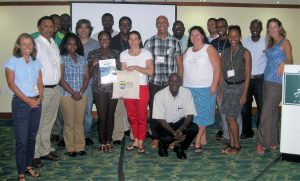Putting socio-economic monitoring findings into action
In 2011, socio-economic monitoring was one of the aspects of MPA management where MPAs reported having lowest capacity. Since then, priority MPA managers from seven countries/territories have taken part in SocMon training with support from GCFI and NOAA , and SocMon studies have subsequently been completed for five Caribbean MPAs. Training was provided by Maria Pena, SocMon Coordinator for the English-speaking Caribbean, and Arie Sanders, SocMon Coordinator for Central America.
 Yet despite training and assistance with baseline studies, a challenge for all MPAs is to ensure that monitoring data is analyzed, interpreted and applied in decision-making to guide MPA management action. Sometimes a further challenge comes from the fact that MPA management objectives evolve over time, or operational challenges change. At the third regional peer-to-peer workshop, held in conjunction with the 67th GCFI meeting Barbados, participants focused on the application of SocMon findings to adaptive MPA management. Global SocMon Coordinator, Peter Edwards from NOAA co-facilitated the third peer-to-peer workshop. This was the first attempt by SocMon globally to bring MPA managers together to focus on their management objectives and operational challenges, and to prepare a summary of action-oriented management recommendations using existing SocMon data. In this way the workshop brought added value to already completed SocMon studies.
Yet despite training and assistance with baseline studies, a challenge for all MPAs is to ensure that monitoring data is analyzed, interpreted and applied in decision-making to guide MPA management action. Sometimes a further challenge comes from the fact that MPA management objectives evolve over time, or operational challenges change. At the third regional peer-to-peer workshop, held in conjunction with the 67th GCFI meeting Barbados, participants focused on the application of SocMon findings to adaptive MPA management. Global SocMon Coordinator, Peter Edwards from NOAA co-facilitated the third peer-to-peer workshop. This was the first attempt by SocMon globally to bring MPA managers together to focus on their management objectives and operational challenges, and to prepare a summary of action-oriented management recommendations using existing SocMon data. In this way the workshop brought added value to already completed SocMon studies.
Nine MPAs took part in the two-day meeting, together with a team of MPA management experts from NOAA, GCFI, TNC, UNDP and St George’s University (17 participants in total). Based on an example interpretation of MPA management actions arising from one of the SocMon baseline studies, each MPA manager worked with a mentor to summarize key findings of their own SocMon results, identify indicated MPA management actions and incorporate them into MPA management plans, communications strategies and day-to-day MPA management activities. This SocMon activity provides a possible approach for SocMon globally to help MPA managers with obtaining practical guidance from their SocMon studies.
